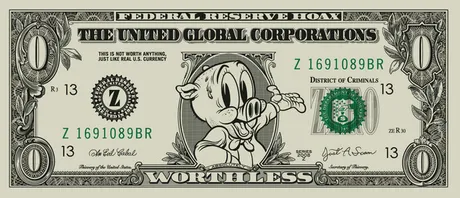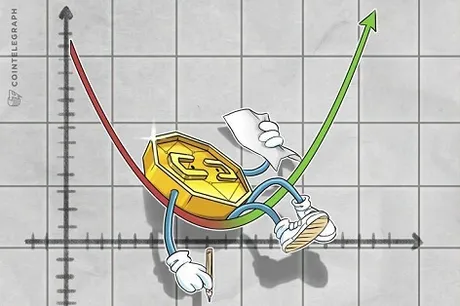
Fiat currency is guaranteed to lose purchasing power over time. Honestly, I'm not sure if it's due to pure greed or just the way the economy is set up (maybe both) but a constantly devaluing currency seems to be the standard worldwide.
Normally I refer to this as "debt-slavery". All fiat currency is debt owed back to the central bank at interest. Said interest does not exist, so one must go into even more debt just to pay back the original debt. On and on it goes in a never ending spiral, gobbling up everyone at the bottom of the meat grinder by design and keeping most citizens quite poor in the process.

The "American Dream" was sort of founded on the principal that anyone could escape that nightmare if they worked hard enough. On a mathematical level, that's simply not true. We are grading on a curve here, and those at the bottom of said curve are bound to be gobbled up no matter how hard they tried to scramble on top of the others who are in turn scrambling on top of them. Someone's going to be on the bottom of this doggie pile no matter what.
But of course there are many strategies to make sure that we are not on the bottom of the pile. Many people out there do not have the discipline or luck to avoid the meat grinder, so employing these strategies is a great way to get out from underneath the boot we find ourselves under.
Rule #1: buy a house.
Get a wife, 2.5 kids, and don't forget the white-picket fence. Buying a house has been a mainstay of the so-called American Dream. By pumping equity into a house instead of renting, one can build their value without constantly racing against currency devaluation.
The problem with real estate is that it is a huge commitment and property is extremely illiquid and hard to sell without incurring huge fees. Also, when something goes wrong, you have to pay for it, as you are the land-lord. On top of that you have to get a huge loan. By the time you are done paying off a 30 year loan you'll be lucky if you don't end up paying double the price from interest. Oops... not great.
Regardless, owning real-estate is still considered by many the ultimate way to build equity safely without a whole lot of risk involved. Seems like these days it can be cheaper month to month to buy than it is to rent, which is pretty crazy when you think about it, as renters lose 100% of the money they pay into their domicile.

Rule #2: acquire precious metals.
Used to be that gold, silver, and copper WERE currency. Not so much anymore. Still, many view these kinds of "hard-money" as a way to store value without the daunting task of acquiring some massive loan from a bank.
However, unlike crypto, coins/bars can be counterfeit or debased. In addition to that attack vector, the derivatives market now controls the primary asset, which is completely backwards. It is heavily theorized that the futures market has been suppressing the value of precious metals for decades. When looking at the price of gold and silver over time, we see that it hasn't really been worth it compared to the loss of purchasing power of USD.
Rule #3: invest in the stock market
Equities have been hot for quite some time now. This is where the real money is at. Just like precious metals, one doesn't have to acquire a loan from a bank to buy securities, and they are much more liquid than real estate could ever hope to be.
At the same time the stock market is heavily regulated, has a lot of fees, and is completely controlled in a centralized manner.
https://www.investopedia.com/ask/answers/050415/why-increase-capital-stock-companys-balance-sheet-bad-sign-stockholders.asp
However, a company commonly has the right to increase the amount of stock it's authorized to issue through approval by its board of directors. Also, along with the right to issue more shares for sale, a company has the right to buy back existing shares from stockholders.
Hm, yeah, so that's not great.
Like fiat, companies can print stock on demand and devalue everyone else's investment. They can also apparently buy you out and take your stock if they want. Pretty weird. This is the way of the legacy economy.
Rule #4: acquire crypto (duh)
Crypto is the one asset on the planet that can't be counterfeit or confiscated. Every server has a copy of the ledger, so every server knows when someone tries to cheat, in which case they are immediately blocked from doing so. One could never hope to achieve such success with any kind of physical currency. If it exists in the real world, you can fake it.
There are zero ways to acquire stocks/bonds without buying them. With crypto, there are already several ways to get paid without risking any value upfront. Yada yada yada. Preaching to the choir.
Rule #5: cash is not trash!
Yeah, USD might be guaranteed to lose value, but it also has a great track record of losing that value very slowly over time. There's a reason most of the world uses it as a reserve currency. It's dependable and has a reputation to back it up, no matter what they did to get there.
With the advent of defi and stable-coins, we see that USD (or derivatives of it) are used all over the cryptosphere. Why is that? Because stability has immense value, and stability is exactly what crypto lacks. We aren't going to cancel this deal with the devil anytime soon.
When half of our defi yield farms can be paired to USD, greatly lowering volatility, but still generating massive yields, we can see how valuable cash really is. We no longer have to just let it sit in a bank account dwindling in value year after year.

Rule #6: buy the dip!
We've all heard this mantra before. Well? How are you going to buy the dip if you don't have any fiat to begin with? Fiat is the most stable and liquid asset on the planet. Just because it's guaranteed to lose value over time doesn't mean you shouldn't bite the bullet and hold some of that sweet liquidity on reserve in case of emergency. That's just common sense, especially when paired with concepts like BTFD.
Rule #7: Maintain balance.
It's easy to get greedy in this space. It's easy to go all in, or even worse, go all in and then trade on margin (gamble with borrowed money). The key to trading these markets is lowering volatility, not increasing it. Crypto has more than enough volatility by itself without us getting greedy and increasing it further on purpose. Dollar Cost Averaging is our friend.
Conclusion
The old ways of the legacy economy no longer apply to today's quickly changing economic landscape. Property used to be a safe bet. 2008 showed us otherwise. Precious metals used to be a store of value. Now they are controlled by futures and options. Don't even get me started on the stock market and the rigged game we've all been playing.
All we can do at this point is buy some crypto and hold on for dear life. You know what pairs well with the most volatile and profitable asset on the planet? You know the best way to buy the dip? Holding cash on hand.
Cash is a trash investment, but the ultimate hedge against volatility... assuming you don't live in Venezuela, Hungary, Zimbabwe, Yugoslavia, Poland, Peru, North Korea, France, Austria, Bolivia, China, Brazil, Iraq, Mexico, Vietnam, Germany, Malaya, Greece, Taiwan...
Eh, you get the idea.
Stability matters.
Posted Using LeoFinance Beta
Return from Cash is Trash... Until it isn't to edicted's Web3 Blog
